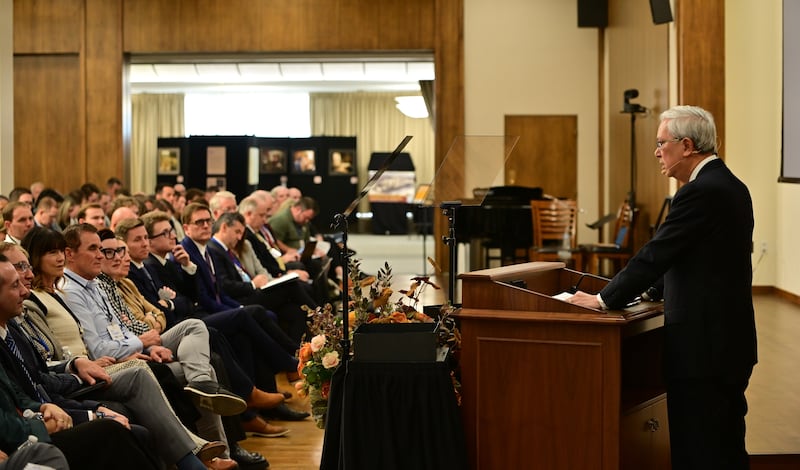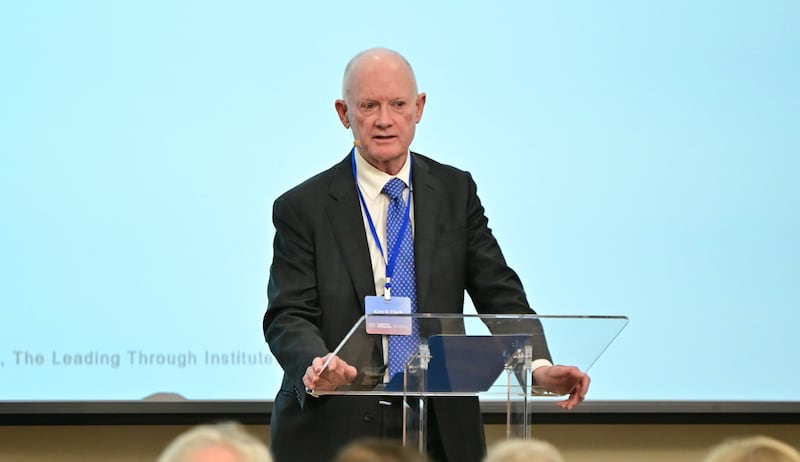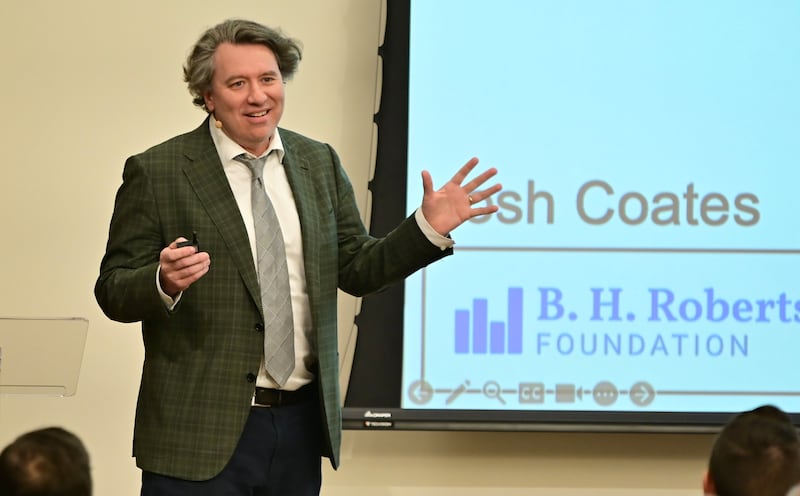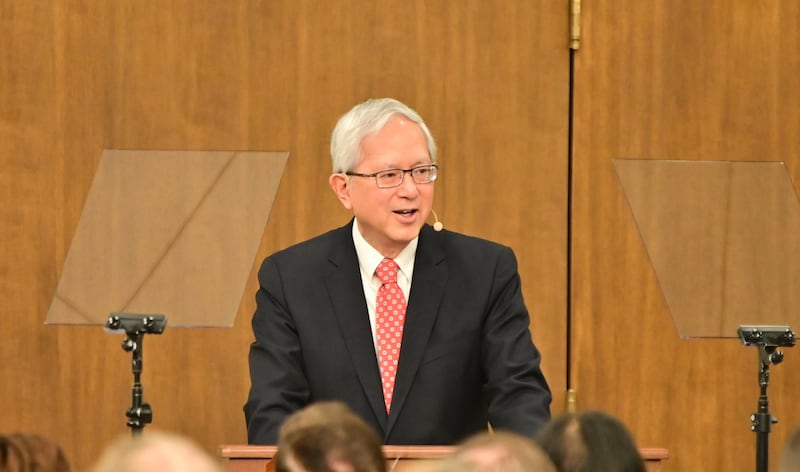The Church of Jesus Christ of Latter-day Saints and many of its members use artificial intelligence every day, but bright lines should be drawn around its limitations, one of its senior leaders said Wednesday.
The church is setting boundaries around whether AI should be used in the creation of images of deity or in the preparation of general conference and sacrament meeting talks, said Elder Gerrit W. Gong of the Quorum of the Twelve Apostles.
“We know artificial intelligence cannot replace revelation or generate truth from God,” he said, “nor should we allow AI to come between us and our personal relationship with God.”
Elder Gong spoke for 40 minutes on the second and final day of “Organized Intelligence,” a conference about Latter-day Saint perspectives on AI. The event was held in the 26th floor conference hall of the Church Office Building in Salt Lake City.
Other presenters spoke about research on church members using AI, suggested the potential positive impact a closed-system AI tutor could have on Latter-day Saint students and shared examples of queries people have made of LDSBot, an AI chatbot.
Elder Gong said the misapplication of AI can distort or interfere with a person’s covenant relationships with God, society, the natural world and self.
“Even if we achieve AGI — artificial general intelligence — or ASI — artificial super intelligence — let us be clear, God is God," Elder Gong said. “AI is not and cannot be God. Man is not, and certainly deity is not, defined solely by knowledge and reasoning.”

While he raised a warning voice about some aspects of AI, he asked people not to infer that AI is inherently bad or should be avoided.
“The fact that a technology can be misused does not mean it should never be used,” Elder Gong said. “AI has much to contribute to human flourishing and the common good.”
In fact, every department at church headquarters is exploring ways AI can help its work to support nearly 32,000 congregations in 195 countries. But, he said, individual Latter-day Saints should be intentional about how they integrate AI into their lives.
“Yes, we will talk and interact with AI systems,” he said, “but AI algorithms do not love, bless or relate to us by divine covenant. In no fundamental way can AI enter into covenantal relationships or bring covenantal blessings.
“God, our Eternal Father, his beloved Son and the Holy Ghost are our ultimate reality. By its nature, artificial intelligence is in some ways always artificial. Deity is never artificial at any time, in any way.”
Latter-day Saints believe that human beings are eternal intelligences who were organized as literal spirit children of God before the world’s creation.
“In its theological sense of light and truth, divine and human intelligence are not and cannot be artificial,” Elder Gong said.
Last year, Elder Gong was asked to share guiding principles about AI to the church’s general authorities, general officers and employees. Those principles can be found at AI.ChurchofJesusChrist.org.
He shared some applications of those principles at church headquarters during his presentation on Wednesday. There was guidance about preparing talks and AI-generated images.
“Those attending general conference should be able to have confidence that all general conference messages to church leaders are divinely inspired,” Elder Gong said. “Because AI cannot replace divine inspiration, nor the individual work that invites it, we ask general conference speakers not to use AI to create initial drafts or final versions of their messages.”
He didn’t set a guideline for church members, but he did say that talks and lessons prepared for weekly Latter-day Saint worship services are best done without artificial help.
“We are teaching church members that we will not grow spiritually if we allow AI to write our sacrament talks or do our seminary homework,” Elder Gong said. “AI cannot replace our individual effort and spiritual preparation as we prepare lessons, prayers and blessings.”
The church also generally refrains from using AI-generated images, he said. Exceptions can be requested but will always be labeled. The same goes for using AI-generated voices.
He drew a bright line around two specific areas.
“The church does not use AI-generated images depicting Heavenly Father and Jesus Christ,” he said.
It also will not clone the voices of church leaders.
He said the church will be careful in the language it uses to describe AI to maintain clarity about its limitations.
“The church will seek to avoid wording that suggests that AI has emotions, judgment, moral agency, spiritual capacity or divine authority,” Elder Gong said.
Like the church itself, Latter-day Saints definitely are using AI, speakers said throughout the conference, which was sponsored by the Future of Life Institute, Faith Matters, Utah Valley University, Clarion AI Partners and others.
Research on Latter-day Saints use of AI
BYU-Idaho’s Matthew Miles and USC’s Peter Cardon pulled Latter-day Saint responses to an AI survey from a larger sample of Americans and said church members fell into three buckets:
- Silicon Saints, who fully integrate AI into faith life and see AI as a tool for spiritual enhancement.
- Compartmentalizers, who use AI but generally separate it from their faith life.
- Spiritual Skeptics, who are mixed with regard to church activity but have deeper concerns about using AI.
At least 75% of each group is worried about whether AI provides inaccurate information, but three-quarters of each also say AI is an appropriate aid for family history work, Miles and Cardon said.
One-half to 88% of respondents said AI is appropriate for gospel study and 48% to 80% said it is appropriate in preparing a talk or lesson.
Chatbot tutors, partners and coaches were another subject of several presentations at the conference. Miles and Cardon said 69% of Silicon Saints find it appropriate to use an AI coach to support spiritual growth, while that number dipped to 30% for Compartmentalizers and 19% for Spiritual Skeptics.
How the Church Educational System could give students an AI tutor or AI coach
Elder Kim B. Clark, an emeritus General Authority Seventy and former commissioner of the Church Educational System, suggested the possibility that customized AI coaches or tutors could help each CES student achieve deep personal learning.

He likened a safe, appropriate system for CES students to the Liahona, a compass provided to a prophet in the Book of Mormon. It would be another “divinely inspired technology for instruction, feedback, counseling, correcting and guiding, used by a righteous person with righteous principles for a righteous purpose,” he said.
An AI system for church students would have to be a custom development created in a private space open only to CES students and governed by CES, Elder Clark said. The system would be trained on the purposes of a CES education and in gospel principles, specific courses and educational objectives. The AI’s training also would include boundaries about what is appropriate.
Within those parameters, Elder Clark said it could be possible to help students achieve deep human learning.
With an AI tutor, students would have to do their own readings, complete their own assignments and write essays themselves. The AI tutor then would provide feedback, support, additional problems and guidance. The tutor would help students think carefully and critically, track the history of interactions with students and assess their progress.
An AI coach system would provide personalized support when practice or learning occurs in the flow of an internship or applied project or work, Elder Clark said. Again, the coach would only be available after a student took action to put concepts into practice in a practical situation, but it could help plan deliberate practice structured to help the students build skills, provide feedback, suggest improvements, provide instruction on specific techniques tailored to the student’s needs and mentor the student with appropriate encouragement.
“AI has the potential to be really powerful in our quest for deep learning,” Elder Clark said, “but it also brings serious traps, pitfalls and challenges. Reaping the benefits and avoiding the traps depends on the kind of relationship we establish with the tools of AI.”
Latter-day Saint use of a safe chatbot about the church
Josh Coates, executive director of the B.H. Roberts Foundation, created LDSBot two years ago.
LDSBot is an AI tool that answers questions about the Church of Jesus Christ. It uses a database that consists of the church’s General Handbook, general conference talks, scriptures, “Come, Follow Me” lessons and more.

LDSBot, which is aligned to be church-positive, has had 900,000 conversations with a couple hundred thousand people, Coates said. AI allows the bot to operate in 84 languages.
He shared a few dozen examples of queries people make.
“Over 90% of users are seeking sincere information about faith, scripture, policy and doctrine,” Coates said. “That’s incredibly good news, as far as I’m concerned.”
The top categories are doctrine/theology/scripture (78%), talks/lessons (17%) and church administration/policy (11%).
Many are very personal queries from real people grappling with real life, Coates said.
“I want to serve a mission,” one person asked the bot, “but what if I don’t know that God and Jesus Christ are real, but I believe and hope they are? Is that enough to serve a mission?”
Coates said the queries show people seeking a safe place to find preliminary answers as a precursor to speaking with a church leader or adviser.


